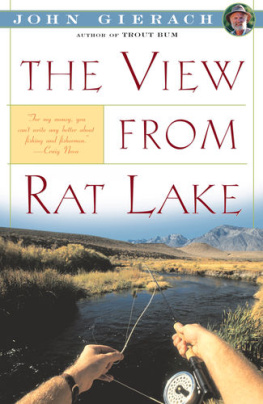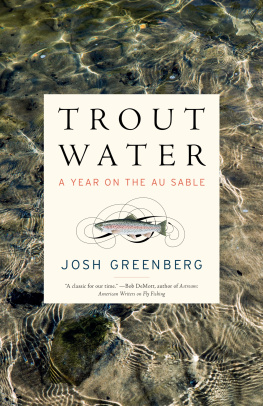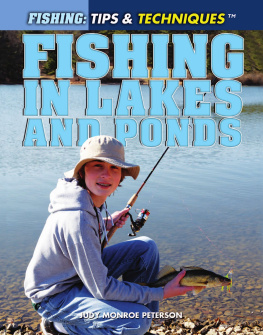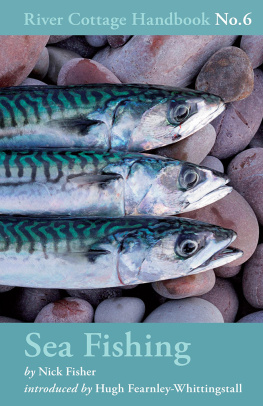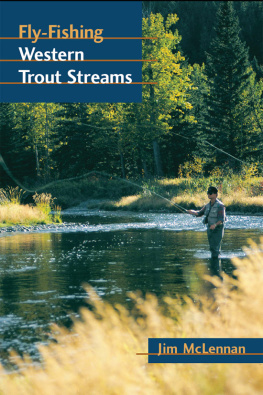About the Author
JOHN GIERACH is the author of more than a dozen previous books, and his work has appeared in Field & Stream, Fly Fisherman, and Fly Rod & Reel, among other publications. He lives in Lyons, Colorado.
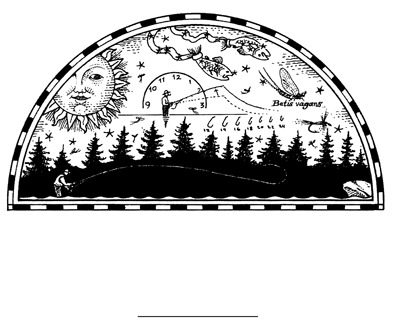 Chapter 1
Chapter 1
The Happy IdiotLATELY Ive been thinking about what makes a good fly-fisher, possibly the last fair question of the twentieth century that might actually have an answer. I mean that in a purely technical sense, as in someone whos pretty good at catching fish on a fly rod. The other stuffthe humor, graciousness, inner peace or whateveris important and may even turn out to be the whole point, but Im not sure you can learn that part. Im beginning to think it either comes by itself with time, or not.
On the other hand, I think you can learn to be a good fisherman (at least I hope so), and its probably easier to get all philosophical about it when you actually catch some fish now and then.
The best way to pick up the nuts and bolts of something like fly-fishing has always been face to face with someone who already knowswhether its a teacher, a friend or a kindly strangerand there can be a lot to learn. Twenty or thirty years ago, when it was becoming fashionable for fishermen to use the Latin names for bugs, outdoor writers joked about getting a doctoral degree in fly-fishing. Now, with introductory to advanced classes, seminars, demonstrations, books and videos on everything from casting to fly tying, certification of casting instructors and such, you can damn near do that, although how much study you need before youre qualified to hook and land a fish is still an open question.
In fact, there are times when fly-fishing seems to be suffering from the same malady that afflicts the rest of society: too many so-called facts and not enough real experience, but I have to say the quality of information on fly-fishing is better than most. Sure, theres the normal showmanship, bullshit or whatever else you want to call it, but if you do precisely what a magazine article tells you to do in the exact conditions described, youll probably catch some fish. On the other hand, you could also catch fish by doing something completely different. Maybe even bigger ones, or more of them.
Not long ago one of those prime-time TV news shows followed the performance of two stock portfolios, one picked by a heavyweight investment counselor, the other picked by a monkey. Naturally, the monkey won. (The investment guy took it well. He said, Can I have the monkeys phone number?) Fly-fishing can be like that, too. Youll probably do well going by the book, but theres also a kind of random goofiness in operation that rewards the happy idiot.
It would be handy to put together the kind of profile the FBI assembles on mad bombersyour typical good fly-fisher is a single, middle-aged male of moderate to low intelligence, sullen, withdrawn, probably lives with his motherbut actually, all the really good fly-fishers I know are unique.
If one is a real match-the-hatch style technician who counts the tails on mayflies and fishes flawless, entomologically correct imitations, another will catch just as many trout drifting a Royal Wulff through the same hatch. For everyone who fishes hard from an hour before dawn until midnight, someone else will land just as many fish but still somehow manage to spend half the day sleeping under a tree.
It is true that most good fly-fishers can go through the motions reasonably well. They can cast, wade, find and stalk fish, select fly patterns, tie strong knots and all that, but if one is the kind of person whod naturally become a great caster, then thats how he comes at it. If not, maybe he becomes an adventurous wader to make up for it, slogging to within fifteen feet of the spot someone else will cast all the way across the river to reach. Its rare for even the best fishermen to be experts at everything, but one way or another, they all get the fly to the fish.
And things change over time, too. Ill probably never be a truly great fly caster, but Im better than I used to be, I do work at it and there have been a few fish Ive caught only because I managed to make a great throw. But then Ive only gotten to be a progressively better caster as my trick knee has gotten trickier (its been known to pop out of joint when pushed sideways by a strong current). I guess Im just taking up slack, although I prefer to think of it as systematically replacing the brute force of youth with adult finesse.
Then again, even though I do cast a little better, I can still get around in the water well enough, too. Years of extreme wading taught me how to pick easier routes through bad currents, and Ive actually developed a meditation technique that lets me lower my center of gravity when Im in the water. So maybe you can do a little better than just break even. With luck, it can be like quitting drinking without entirely losing the sense of fun you learned while you were smashed.
Ive also noticed that a lot of good fishermen have the uncanny ability to immediately turn any conversation to angling with a fly rod, on the theory that the essence of anything is in how its either like or unlike fishing, and they often do it so deftly they dont even stretch the point.
My friend Pat Leonard is in the music business and hes pretty successful at it. (Many good fly-fishers also seem to be very good at something else, too. Im not sure why, although I have some half-baked ideas.) Anyway, its become kind of a joke with us to crack any subject by pretending to search for just the right analogy and then finally saying, Well, its sort of like fishing, isnt it?
The other day Pat was talking about the agonies of writing music, I said, So its sort of like fishing, then, and he said, Well, yeah, except on a bad day your piano doesnt swim under a rock and stay there until you go away.
Pats real successful, as I said, but after too many years spent as a trout bum, I cant help thinking of him as a fisherman who works part-time as a famous record producer to support his habit. Then again, hes enough of a fisherman that he might agree with me.
I also have to say that the best fishermen I know are fanaticsalthough most have been that way for so long that a kind of eerie calm has settled over them, so its not always obviousand they also spend a hell of a lot of time fishing. Some can do that because they have a lot of money. Others dont have much money because they spend a hell of a lot of time fishing. Its like getting the fly to the fish: one way or another, they get it done.
Thats probably the most important part of getting really good at this. Tom McGuane once wrote, Angling is extremely time consuming. Thats sort of the whole point, and its occurred to me a few times, when Ive gotten into some local political battle or idly wondered how Id be paying the mortgage in the next ten or twenty years, that God must have invented fly-fishing to keep old hippies from getting rich or ruling the world.
But then some of us who have it bad for fishing either dont hanker that much for money and power or dont care to do what it takes to get them. All we really want is bigger trout, better rods and a happy sex life.
I guess the one thing all great fly-fishers have in common is, they seem to have figured something out thats eluded the rest of us. Spend much time around one of these guys and you begin to suspect that whatever it takes to catch fish, its not quite what you thought it was. But the hidden truth behind that is, it took them years on the water to arrive at it. Its not just fishing, either. Ask anyone you know whos very good at anything if theres a shortcut to spending half a lifetime learning the ropes and letting something indefinable slowly sink in.



